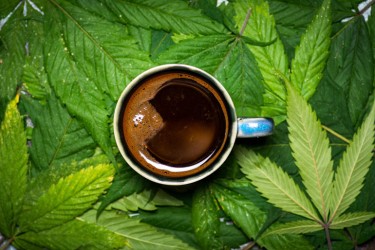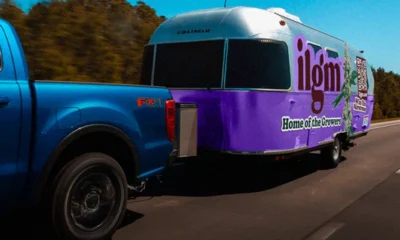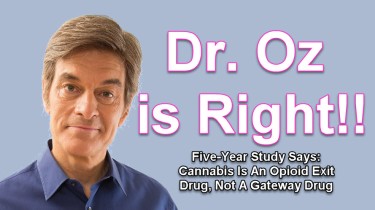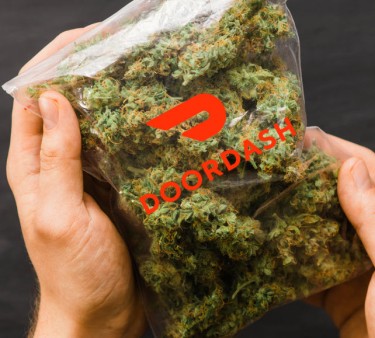Cannabis News
Which is Harder to Quit, Coffee or Cannabis?
Published
1 year agoon
By
admin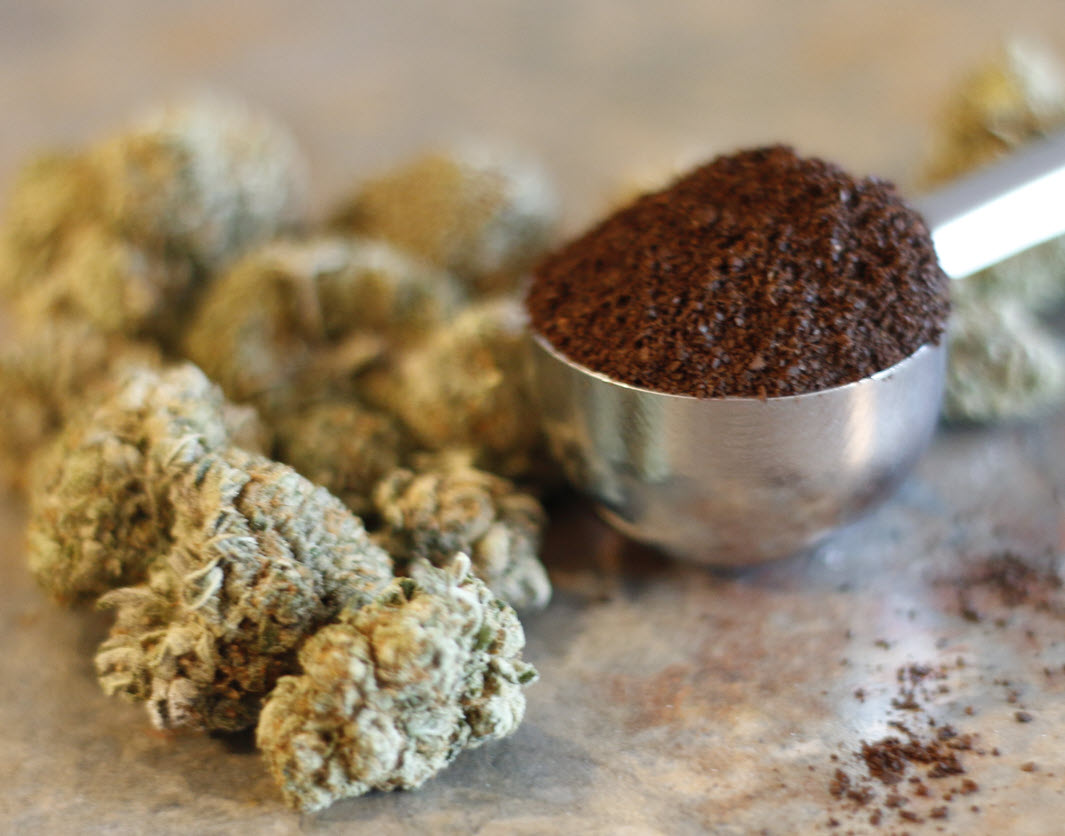
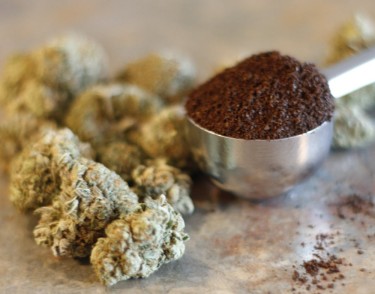
What’s harder to quit, cannabis or coffee?
Two of life’s great pleasures – good coffee and good weed. For me, these botanical bounties pair together like wine and cheese. The perfect harmony of focus from a fresh French roast followed by unwinding with a flavorful Indica. Truly an unbeatable combo!
I’ve enthusiastically partaken in both daily for years. In many ways, quality coffee and cannabis form the yin and yang foundations of my routine. The crisp morning productivity of an expertly pulled espresso followed by the relaxed contemplation from a smoothly rolled evening joint.
At this point, I’m what you might call a “caffeine addict” – already on my third straight black coffee just to write this piece! Yet I also deeply appreciate cannabis for its inspiration and stress relief. Moderation and mindfulness with both remain key, but I just can’t imagine life without these staples.
Which is exactly why I’ve decided to temporarily give up both starting October 1st!
That’s right – in homage to the popular “Sober October” trend, I’m going one step further by nixing my morning cup o’ joe as well. Call it a personal experiment in detachment from substances I’ve used for decades. How difficult will it be to detach from these habits? Let’s discuss…
Some interesting facts about coffee
Before analyzing how difficult it may be to quit, it helps to understand some fascinating facts about my morning elixir of choice – coffee! Here are some intriguing stats and tidbits about the world’s most widely consumed drug:
-
Coffee is the single most popular beverage globally – even more than water! Over 2 billion cups are enjoyed daily. Think about that – people choose coffee more than hydration. Now that’s an addictive substance.
-
Its status as a drug is well deserved. The caffeine in coffee is a powerful psychoactive stimulant. A typical cup contains around 100mg of caffeine – enough for noticeable effects, and potential dependency with regular use.
-
Speaking of addiction, the majority of regular coffee drinkers experience withdrawal effects if they miss their usual dose. Headaches, drowsiness, irritability – I know those symptoms all too well if I don’t get my morning cup.
-
Coffee actually originated in Africa, not South America. The high-energy beans spread along trade routes, which is how coffeehouses sprung up across the Middle East. The brew only arrived in Europe in the 1600s.
-
The Dutch were the first to start the plantation model for coffee in Java. Yet despite the name, Java is just one of countless varietals. Others like Arabica, Robusta, and Kona each have unique flavors and properties.
-
An elaborate trade system evolved around harvesting and distributing beans globally. This gave rise to commodity terms like “java” for Indonesian origin, “mocha” for Yemeni, and “kopi luwak” for the infamously cat poop coffee!
-
Speaking of weird versions, the most expensive coffee in the world is an Indonesian brew called Kopi Luwak. It gets over $700 per pound due to the beans being fermented in the digestive system of Asian palm civets!
-
Finland consumes the most coffee per capita globally, averaging 12kg of coffee per person annually. That’s nearly 2.5 cups per Finn per day! Must be helping them cope with those long winters.
-
Despite its popularity, coffee has a long controversial history. It has been banned at times in various places, especially in religious cultures. But the crackdown never lasts long – people need their fix!
The more you learn, the clearer it becomes that coffee is no mere beverage – it’s a powerful drug ingrained in countless cultures, with an amazing history. Now I’m wondering if I can even survive a month without it!
What are the Expected Withdrawal Symptoms?
Now that we’ve built up the indispensable roles quality coffee and cannabis play in daily life for so many, what happens when you remove them? Let’s explore the potential withdrawal symptoms that may arise when quitting each substance cold turkey:
Cannabis Withdrawal for most cannabis users, abstaining doesn’t lead to serious or dangerous withdrawal. However, some common symptoms include:
-
Mood changes – without your usual stress relief puff, anxiety, irritability, and agitation can increase. Patience may wear thin.
-
Sleep disruptions – many users report insomnia and vivid dreaming when stopping heavy cannabis use. Quality rest suffers.
-
Appetite shifts – the infamous munchies vanish. You may eat less overall and find food less appealing.
-
Boredom – your habit of sparking up to relax or pass time leaves a void. Activities may feel dull and unengaging.
-
Cravings – the psychological desire for the ritual of smoking can be intense for some in the beginning.
These effects are mild for light users, but more pronounced for those consuming heavily, especially strains high in THC. I’ve taken cannabis breaks before with only mild boredom and trouble sleeping. But for heavy medical users, effects likely will be more severe.
Coffee Withdrawal Caffeine withdrawal often packs a bigger punch:
-
Headaches – likely the most infamous symptom. Without your usual vasoconstriction, blood vessels in the brain dilate, pulsing and pressing. Pain ensues.
-
Fatigue – the energetic boost coffee provides disappears. Without stimulation, expect strong drowsiness, yawning, and low motivation.
-
Brain fog – concentration and focus decline without caffeine stoking your synapses. You may feel cloudy and absent-minded.
-
Irritability – cranky moods and emotional reactivity emerge as your brain misses its usual lift. Short temper and negativity manifest.
-
Nausea – digestion seems off, and some feel outright nauseous without coffee’s biological effects. Upset stomach prevails.
-
Depression – coming off long-term caffeine usage can significantly disrupt mood via neurotransmitter changes. You may feel down.
Symptoms peak 2-3 days in and last 1-2 weeks for most. But effects can linger for multiple weeks in heavy drinkers.
This won’t be a cakewalk – but that’s the point of my experiment!
Coping Mechanisms for Quitting Coffee
This laundry list of daunting withdrawal symptoms may have me second-guessing my coffee cleanse. But I’m no quitter – it’s only 30 days, and there are ways to reduce the misery. Here are coping strategies I plan to use:
Tapering Quitting cold turkey maximizes shock to your body. I’ll start slowly tapering my intake over a week pre-break. This gives my brain time to adjust to steadily lowering amounts of caffeine rather than immediate deprivation.
Alternate Beverages Luckily, we now have many delicious caffeine-free (or very low caffeine) coffee alternatives. Brands like Dandy Blend, Pero, Cafix use ingredients like chicory root, barley, rye to mimic flavor and ritual. Sipping these instead of water will help trick the brain.
Exercise Nothing relieves restlessness and boosts energy like exercise. I’ll be diligent about daily movement to counter fatigue. Light workouts also alleviate headaches by increasing circulation. Getting the blood pumping is key.
Meditation Centering practices like breathwork, yoga, and meditation will keep me relaxed. And I can use the extra time usually spent sipping coffee for quiet contemplation. A calm mind counters irritability.
Healthy Eating Nutrient dense whole foods provide stable energy lacking from coffee. I’ll craft healthy meals and stay hydrated to nourish body and brain. Good health habits combat withdrawal.
Cannabis (strategically) I may allow limited cannabis use in the evenings initially to aid sleep issues. And oral THC could relieve headaches without smoking. But I must be cautious not to overuse weed for energy or mood. Moderation is mandatory.
Persistence Ultimately, I’ll need grit and willpower to push through acute symptoms. But remembering it’s only 30 days and staying focused on goals keeps me on track. Some discipline goes a long way when quitting.
With preparation and mitigation techniques, I believe I can reduce negative impacts significantly while staying committed. While coffee withdrawal will still be challenging, I aim to make it manageable. It may not be fun, but growth often requires some sacrifice. I got this!
The Sticky Bottom Line
Alright, it’s time to talk about taking that leap.
I’ve been around the block, experimented with substances from cannabis to alcohol and tobacco. Coffee—it’s been the inevitable next one on the list, a leap I’ve been contemplating for a while now. Well, the time has come, and here’s why I’m going for it.
First off, let’s acknowledge the crew I’ve rolled with before. Each substance had its own story, its own quirks, and its own lessons. Cannabis, with its mellowness, opened doors to creativity. Alcohol, the social lubricant, brought unforgettable nights and wicked hangovers. Tobacco, with its calming ritual, became a companion during contemplative moments.
Now, let’s address the big question: why coffee? What’s the allure? It’s simple. Coffee isn’t just a beverage; it’s a journey waiting to be embarked upon. It’s a portal to a world of flavors, a shot of energy to kickstart the day, and a warm hug on chilly mornings. Coffee, unlike my previous companions, won’t make me lose my inhibitions or send me into another dimension. Instead, it’ll sharpen my focus and set the tone for the day ahead.
I recently found myself in a familiar scene—a friend’s birthday bash at the local bar. I had a couple of drinks, nothing crazy, and yet, the next day’s hangover hit me like a freight train. The pounding headache, the overpowering nausea, the lethargy—it was a misery I’d experienced before, a stark reminder of alcohol’s destructive side.
That got me thinking about the dramatic contrast between overindulging in alcohol and giving coffee a shot. With alcohol, a wild night might lead to a brutal hangover or worse. With coffee, you might get uncomfortably wired, but there’s no risk of alcohol poisoning or a pounding headache that makes you swear off booze (until the next celebration, of course).
So, what’s the sticky bottom line here? Coffee is different. It’s a new adventure, a chance to explore uncharted territory. But let’s talk about the elephant in the room—caffeine addiction. I’ve seen friends dive headfirst into the world of coffee, unable to function without their daily fix. Moderation is key, the same lesson I’ve learned through my past experiences.
Coffee isn’t meant to be a puppet master; it should be a companion. It’s a warm embrace in the morning, a source of energy during midday slumps, and a comforting presence during late-night creative endeavors. I’ll tread carefully, keeping it in check, and ensuring it doesn’t take control.
And then there are the flavors! Coffee isn’t just about caffeine; it’s a symphony for the taste buds. From the simplicity of black coffee to the complexity of lattes and cappuccinos, there’s a world of flavors waiting to be explored. It’s a journey in itself, one that I’m excited to embark upon.
So, here’s the deal—I’m taking that plunge into the world of coffee. It’s a new adventure, a fresh chapter in my book of experiences. It’s not just a beverage; it’s a culture, a ritual, a world of possibilities. And like every adventure, it comes with its quirks and potential pitfalls, but I’m ready.
Coffee, here I come! May you be my muse on busy mornings, my companion on lazy afternoons, and the inspiration behind countless conversations. This is it—a fresh start, a new journey, and a whole lot of coffee to explore.
Here’s to the warmth of that first morning brew, the camaraderie of coffee shops, and the endless opportunities over cups. This is me, taking that plunge, ready to embrace the world of coffee with open arms.
Cheers to the adventures that await!
MORE ON CANNABIS AND COFFEE, READ ON…
Cannabis News
Daily Cannabis Use Can Help People Get Off Opioids (STUDY)
Published
2 hours agoon
March 28, 2025By
admin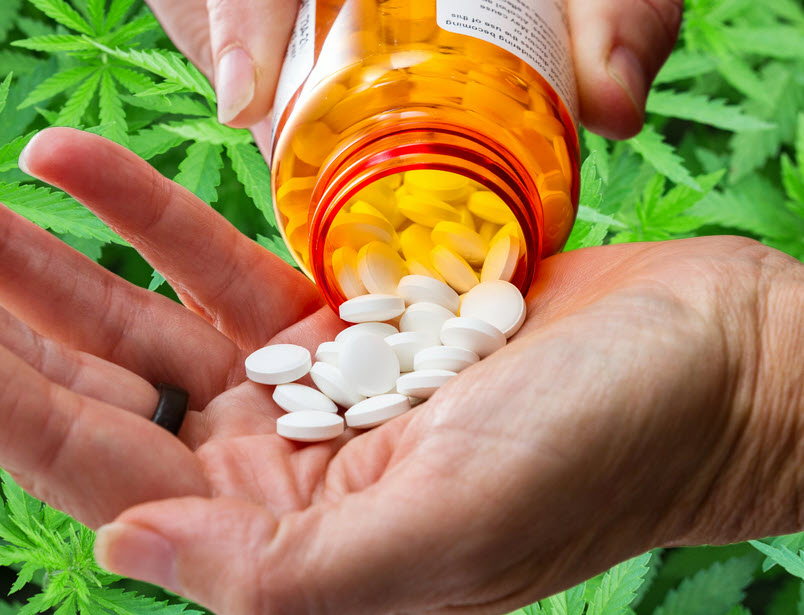

Cannabis daily can help people get off opioids (STUDY)
As Donald Trump continues to trudge on in his second term, he’s made it abundantly clear that tackling the fentanyl crisis is high on his agenda. The rhetoric is bold and aggressive – promises to go after cartels with military force, threats against drug dealers, and a generally hawkish stance toward drug trafficking. It’s the kind of tough talk that plays well to his base, but the question remains: will it actually solve anything?
If we look at his appointments and policy directions, it seems we’re heading for War on Drugs 2.0 rather than an innovative approach to a complex problem. History has taught us that you can’t simply bomb, arrest, or threaten your way out of drug epidemics. These tactics have been tried for decades with little success.
There is, however, one solution hiding in plain sight that could revolutionize Trump’s approach to the opioid crisis – cannabis legalization. Yes, you read that correctly. If Trump were to take the bold step of federally legalizing cannabis, he could potentially cement his legacy as one of the most transformative presidents in modern history.
It sounds counterintuitive at first – fighting drugs with another drug? But the evidence is mounting that cannabis could be a powerful weapon against opioid addiction and overdose deaths. Recent studies are showing promising connections between cannabis use and reduced opioid dependency.
So how exactly would legalizing a plant help combat the deadliest drug crisis in American history? Well, let me tell you!
A groundbreaking study published last week in the journal Drug and Alcohol Review has added significant weight to the argument that cannabis could help combat the opioid crisis. The research, conducted by an eight-person team from the British Columbia Centre on Substance Abuse, the University of British Columbia, and Simon Fraser University, examined data from 1,242 people who used drugs while also living with chronic pain.
Their findings were striking: “Participants reporting daily cannabis use exhibited higher rates of cessation compared to less frequent users or non-users.” In other words, those who used cannabis every day were more likely to quit using opioids altogether. This effect was particularly pronounced among men, suggesting “potential differences in cannabis use behavior and effects” between sexes.
This isn’t an isolated finding. A growing body of research supports the idea that cannabis can serve as an effective substitute for opioids. A federally funded study found that in states with legal marijuana, prescriptions for opioid pain medications dropped significantly among commercially insured adults. Another study discovered that legalizing medical cannabis appeared to significantly reduce payments from opioid manufacturers to doctors specializing in pain management – further evidence that cannabis was replacing prescription painkillers.
Perhaps most compelling is the research linking cannabis legalization to reduced fatal opioid overdoses. One study estimated that recreational marijuana legalization “is associated with a decrease of approximately 3.5 deaths per 100,000 individuals.” When you consider that over 107,000 Americans died from drug overdoses in 2021 alone (with 75% involving opioids), the potential life-saving impact becomes clear.
The opioid crisis has ravaged communities across America, destroying families and costing the economy an estimated $1.5 trillion annually in healthcare costs, criminal justice expenses, and lost productivity. Cannabis legalization offers a multi-pronged solution: it provides a safer alternative for pain management, reduces dependency on opioids, and potentially saves thousands of lives each year.
Beyond addressing the opioid epidemic, legalizing cannabis would create hundreds of thousands of new jobs, generate billions in tax revenue, reduce unnecessary incarcerations (particularly in communities of color), and open up new avenues for medical research and international commerce.
For a businessman-turned-president like Trump, the economic case alone should be compelling. The question is whether he has the vision to seize this opportunity or if he’s too beholden to interests that benefit from prohibition – pharmaceutical companies, private prisons, and law enforcement agencies that rely on drug war funding. If he truly wants a slam dunk policy that would address the fentanyl crisis while creating jobs and stimulating the economy, cannabis legalization could be his legacy-defining move.
While we wait for politicians to catch up with science, those suffering from chronic pain or other conditions treatable with cannabis might consider a more immediate solution: growing your own medicine.
Now, let me be crystal clear – I’m not advocating breaking the law. If cannabis is illegal in your state, I don’t want you risking arrest and criminal charges. However, speaking personally, if I were suffering from chronic pain and had few options, I might consider a small, discreet grow operation of 2-4 plants. This would be my absolute secret – something I’d never discuss with anyone, ever.
The beauty of growing your own cannabis extends far beyond just having a supply of medicine. There’s something profoundly therapeutic about nurturing a plant from seed to harvest. You develop patience, attention to detail, and a deeper connection to the plant medicine you’re creating. It’s a relationship, not just a transaction.
When you grow your own cannabis, you also know exactly what’s in it. No pesticides, no mysterious contaminants – just pure plant medicine cultivated with care. You can select strains specifically bred for your conditions, whether that’s pain, anxiety, insomnia, or inflammation. The process puts the power of healing back in your hands.
Beyond the primary flower, home growers can make use of every part of the plant. Fan leaves can be juiced for their non-psychoactive cannabinoid content. Trim can be used to make topicals or edibles. Even the stems can be used to make teas or tinctures. Nothing goes to waste.
There’s also a significant cost advantage. A small home grow can produce enough medicine to last months, potentially saving thousands of dollars compared to dispensary prices. For those on fixed incomes or without insurance coverage for their conditions, this economic benefit can’t be overstated.
I firmly believe that any meaningful cannabis legalization bill must include provisions for home cultivation. Without the right to grow your own medicine, legalization is merely transferring authority from one controlling entity to another. It’s still authoritarianism masquerading as freedom, just with different gatekeepers.
The right to grow is fundamental to true cannabis freedom. It acknowledges the plant for what it is – a natural resource that should be accessible to all, not just those who can afford to purchase it from state-sanctioned vendors. Home cultivation empowers individuals to take control of their own health without excessive dependence on either the black market or corporate cannabis.
While we push for policy change at the federal level, let’s not forget that sometimes the most revolutionary act is simply planting a seed.
The evidence is overwhelming: we’re facing an unprecedented opioid epidemic that’s claiming thousands of American lives every year, and cannabis represents a viable, evidence-based solution to this crisis. The latest research confirming that daily cannabis use can help people quit opioids adds to the mountain of data supporting cannabis as a harm reduction tool.
Yet despite the scientific consensus, I’m not holding my breath for federal action. The sad reality is that most politicians on both sides of the aisle receive substantial funding from industries that benefit directly from cannabis prohibition – pharmaceutical companies pushing their own patented pain medications, private prison corporations dependent on drug offenders to fill beds, and police departments that receive military-grade equipment through drug war budgets.
These entrenched interests have billions of reasons to maintain the status quo, and they’ve proven remarkably effective at delaying meaningful reform for decades. Even as public opinion has shifted dramatically in favor of legalization, with roughly two-thirds of Americans now supporting it, policy changes creep along at a glacial pace.
Perhaps Trump, with his penchant for disruption and unpredictability, could surprise us all by embracing cannabis reform as part of his anti-fentanyl strategy. It would certainly align with his populist messaging and “America First” economic policies. A thriving legal cannabis industry would create jobs, boost tax revenues, and potentially save countless lives from opioid overdoses.
I can hope for such bold leadership, but I’ll continue preparing for the long, slow grind of incremental progress. In the meantime, the opioid crisis rages on, claiming lives that could potentially be saved with a plant that’s been used medicinally for thousands of years. If that’s not a tragedy of policy failure, I don’t know what is.
CANNABIS TO REDUCE OPIOID USE, READ ON…
DR. OZ SAYS CANNABIS CAN GET PEOPLE OFF OPIOIDS, HOW DOES IT WORK?
Cannabis News
Can You Order Cannabis through DoorDash?
Published
1 day agoon
March 27, 2025By
admin

DoorDash Expands Delivery Services to Cannabis (Hemp) Home Delivery: A New Era in Convenience
In a groundbreaking move, DoorDash, one of the leading food delivery companies in the United States, has announced its expansion into cannabis home delivery. This strategic decision marks a significant shift in the company’s business model, as it ventures beyond its traditional offerings of food and groceries to tap into the rapidly growing cannabis market. The move is part of DoorDash’s broader strategy to diversify its services, following successful forays into alcohol and grocery delivery.
The Rise of Cannabis and CBD Products
Over the past decade, there has been a remarkable shift in public perception and legal frameworks surrounding cannabis and CBD products. As more states legalize marijuana for medical and recreational use, the demand for cannabis-related products has skyrocketed. This trend is not limited to traditional cannabis products; hemp-derived CBD and THC products have also gained popularity due to their perceived health benefits and legal availability in many states.
The cannabis Industry’s growth is driven by consumer interest in wellness and relaxation products. CBD, in particular, has become a staple in many health-conscious consumers’ routines, with products ranging from oils and gummies to beverages and skincare. As the market expands, companies are looking for innovative ways to reach consumers, and delivery services are becoming increasingly important.
DoorDash’s Entry into Cannabis Delivery
DoorDash’s decision to enter the cannabis delivery market is a strategic move to capitalize on this trend. The company has built a robust infrastructure over the years, with a vast network of Dashers (delivery personnel) and partnerships with local businesses. By leveraging this existing infrastructure, DoorDash aims to provide a seamless and convenient experience for customers looking to purchase cannabis products from the comfort of their homes.
Key Features of the Service
-
Products Available: DoorDash will initially focus on delivering hemp-derived THC and CBD products. These include a variety of gummies, beverages, and other consumables that comply with federal regulations, containing no more than 0.3% Delta-9 THC by dry weight. This ensures that the products are legal across the country, allowing DoorDash to operate in multiple states without violating federal laws.
-
Partnerships: To facilitate these deliveries, DoorDash has partnered with several merchants. DashMart, a convenience store concept operated by DoorDash, will be a key partner, offering a range of cannabis products. Additionally, partnerships with retailers like Total Wine & More and ABC Fine Wine & Spirits will further expand the product offerings. DoorDash has also collaborated with Cann, a leading hemp-infused social beverage company, to provide customers with a diverse selection of cannabis-infused drinks.
-
Availability: Initially, the cannabis delivery service will be available in select states, including Georgia, Kentucky, Iowa, Louisiana, and Tennessee. These states were chosen based on their regulatory environments and market demand. DoorDash plans to expand its services to other states as local regulations evolve and market conditions become more favorable.
Safety and Compliance Measures
Ensuring safety and compliance is paramount for DoorDash as it ventures into cannabis delivery. The company has implemented robust measures to prevent underage access to these products, mirroring the protocols used for alcohol deliveries.
-
Age Verification: Customers must undergo electronic ID checks to verify their age. This process ensures that only adults aged 21 and older can purchase cannabis products through DoorDash.
-
Dasher Eligibility: Only Dashers who are at least 21 years old are eligible to fulfill cannabis delivery orders. This ensures that all deliveries are handled responsibly and in compliance with legal requirements.
-
Secure Packaging: Products are securely packaged to prevent tampering and ensure they reach customers safely.
Market Implications
DoorDash’s entry into the cannabis delivery market has significant implications for both the company and the broader cannabis industry.
Competitive Advantage
By expanding into cannabis delivery, DoorDash gains a competitive advantage in the delivery services market. It positions itself as a leader in convenience and innovation, appealing to a growing demographic interested in cannabis products. This move also allows DoorDash to diversify its revenue streams, reducing dependence on traditional food delivery services.
Market Growth Potential
The cannabis market is projected to continue growing as more states legalize marijuana and consumer interest in CBD products increases. DoorDash’s early entry into this market gives it a first-mover advantage, allowing it to establish strong partnerships and build brand recognition before competitors follow suit.
Regulatory Challenges
While DoorDash’s initial focus on hemp-derived products avoids federal legal issues, the company must navigate complex state-by-state regulations. As the legal landscape evolves, DoorDash will need to adapt its services to comply with changing laws and regulations. This could involve expanding into states with recreational marijuana laws or adjusting product offerings based on local restrictions.
Impact on the Cannabis Industry
DoorDash’s involvement in cannabis delivery is likely to have a profound impact on the cannabis industry as a whole.
By providing home delivery services, DoorDash increases accessibility to cannabis products for consumers. This is particularly beneficial for those who may have difficulty accessing physical dispensaries due to location or mobility issues. Increased accessibility can drive market growth by expanding the customer base.
For cannabis brands, partnering with DoorDash offers an opportunity to increase visibility and reach a wider audience. DoorDash’s platform provides a trusted and familiar interface for consumers, which can enhance brand credibility and appeal.
As DoorDash enters the cannabis delivery space, it will likely spur competition among existing delivery services and dispensaries. This competition can drive innovation, leading to better services, more competitive pricing, and a wider range of products available to consumers.
Challenges and Opportunities
While DoorDash’s move into cannabis delivery presents numerous opportunities, it also comes with challenges.
The cannabis industry is heavily regulated, and laws vary significantly from state to state. DoorDash must navigate these complexities to ensure compliance and avoid legal issues. As regulations evolve, the company will need to be agile in adapting its services.
Despite growing acceptance of cannabis, there remains a stigma associated with its use. DoorDash may face challenges in changing public perception and ensuring that its brand is not negatively impacted by its involvement in cannabis delivery.
To provide a seamless delivery experience, DoorDash will need to integrate its technology with that of cannabis retailers. This includes ensuring accurate inventory management, efficient order processing, and secure payment systems.
Future Prospects
As DoorDash expands its cannabis delivery services, the company is well-positioned for future growth. Several factors suggest that this move will be successful:
1. Growing Demand: The demand for cannabis and CBD products is increasing, driven by consumer interest in wellness and relaxation.
2. Regulatory Evolution: As more states legalize marijuana, the regulatory environment is likely to become more favorable for cannabis delivery services.
3. Technological Advancements: Improvements in technology will enhance the delivery experience, making it more efficient and secure.
Conclusion
DoorDash’s decision to expand its delivery services to cannabis products marks a significant milestone in the company’s history. By leveraging its existing infrastructure and partnering with key players in the cannabis industry, DoorDash is poised to capitalize on the growing demand for cannabis and CBD products. As the legal landscape continues to evolve, DoorDash is well-positioned to adapt and expand its offerings, potentially paving the way for broader cannabis delivery services in the future.
This move not only reflects DoorDash’s commitment to innovation and customer convenience but also highlights the company’s strategic vision for growth and diversification. As the cannabis industry continues to grow, DoorDash’s early entry into this market positions it as a leader in the delivery sector, setting the stage for a new era in convenience and accessibility for cannabis consumers.
DOORDASH FOR MUNCHIES AND WEED, READ ON…
Cannabis News
Safe Cannabis Consumption During Wildfire Season
Published
2 days agoon
March 26, 2025By
admin

Wildfire season can be challenging, particularly if you regularly enjoy cannabis. Though you might enjoy lighting up, smoky skies mean you should rethink your consumption. Given poor outside air quality, lung protection becomes especially crucial. Fortunately, there are easy, safer approaches to enjoying cannabis without aggravating your lungs more than necessary. Make sure you’re ready for easy breathing all season.
Understanding Wildfire Smoke and Its Health Risks
Not only is wildfire smoke unpleasant, but it also compromises your health—especially that of your lungs. Small particles known as PM2.5 abound in smoke from wildfires. These small toxins readily get deep into your lungs and aggravate inflammation, irritation, and dyspnoea. Breathing in wildfire smoke can aggravate allergies, asthma, or respiratory problems you already have.
Though generally healthy, constant exposure to smoky air can cause coughing, sore throats, headaches, and tiredness. Since cannabis users already expose their lungs to irritants, wildfire smoke can exacerbate that discomfort. Choosing cannabis consumption techniques free of extra smoke helps you protect your lungs during the wildfire season.
Harmful gases, including carbon monoxide and volatile organic compounds (VOCs), abound in wildfire smoke as well. These substances affect your general health by entering your bloodstream and lowering the oxygen supply to important organs. Constant exposure can compromise your immune system, impairing your body’s ability to combat diseases. Being proactive in your defense against wildfires will help avoid major long-term medical problems.
Safer Cannabis Consumption Methods During Wildfire Season
During wildfire season, you really should vary your cannabis regimen. Here’s how you can still enjoy cannabis responsibly even with smoky skies:
Opt for Smoke-Free Alternatives
Edibles are the ideal option in wildfire season. They give all the advantages and leisure of cannabis without requiring smoke inhalation. Edibles abound in several forms:
-
Gummies
-
Chocolate bars
-
Cookies
-
Beverages
If you have never used edibles, start with a low dose. Edibles take more time to start, usually up to an hour or more, thus be patient to prevent inadvertently overconsuming.
Another great smoke-free substitute is tinctures. To quickly absorb a measured dosage, just drop it under your tongue. Additionally providing exact dosages free of smoke are capsules and oils. Selecting these choices lets you keep enjoying your cannabis experience without sacrificing lung health.
Without having any effect on your respiratory system whatsoever, topicals and creams can also help with muscle aches or inflammation. Perfect during wildfire season, these products let you benefit from cannabis without consumption or inhalation.
The demand for these smokeless options is probably higher at your local cannabis dispensary on high-smoke days. During times of low air quality, many budtenders are ready to direct patrons toward lung-friendly options.
Vaporisation: A Better (But Not Perfect) Alternative
Particularly in wildfire season, vaporising can be safer than smoking if you still want to inhale cannabis. Vaporizers heat cannabis just enough to release cannabinoids without generating dangerous smoke particles. Although not entirely risk-free, vaping greatly lessens harmful irritants compared to more conventional smoking practices.
Still, vaping can aggravate some lungs, especially when wildfire smoke already influences air quality. If vaping is your preferred approach, select premium cannabis concentrates from a reputable cannabis dispensary to reduce contaminants and guarantee you’re breathing the purest vapour available.
Devices with temperature control might help you improve your vaping experience. Lower temperatures provide a safer and smoother inhale by reducing irritant creation. Maintaining a clean vaporiser also guarantees fewer pollutants are breathed in, shielding your respiratory system.
Tips for Those Who Still Choose to Smoke or Vape
Despite the extra risks during wildfire season, some cannabis users strongly prefer traditional smoking methods. These safety measures can lessen the effect on your lungs.
Stay Indoors with Air Purifiers
-
Staying indoors helps you avoid breathing wildfire smoke.
-
If smoking cannabis at home, consider running an air purifier with a HEPA filter. These filters collect small harmful particles, maintaining safer and cleaner indoor air.
-
Regularly replace or clean air purifier filters to guarantee best performance.
-
Creating a “clean room” with sealed windows and a powerful air purifier offers another layer of protection.
Use a High-Quality Filter or Respirator Mask
-
If smoking outside, wear an N95 mask afterwards to reduce inhalation of wildfire smoke particles.
-
Masks cannot completely remove all hazards but greatly lower your exposure.
-
Choose masks tagged “N95” or “KN95” for maximum protection. These masks offer superior protection compared to cloth or surgical masks.
Hydrate & Support Lung Health
Taking care of your lungs during wildfire season transcends simple smoke avoidance:
-
Stay hydrated by drinking plenty of water to maintain good lung function.
-
Herbal teas, such as ginger or peppermint, help clear mucus accumulation and reduce inflammation.
-
Use a humidifier indoors to moisten airways and ease coughing or irritation.
-
Frequent deep-breathing exercises improve lung capacity and general respiratory condition.
-
Consider natural supplements like omega-3 fatty acids and vitamin C to reduce inflammation and strengthen immunity.
-
Indoor plants like peace lilies or snake plants naturally help clean indoor air, enhancing your environment during wildfire season.
Conclusion
While it’s not necessary to give up cannabis entirely during wildfire season, it’s certainly a time to reconsider your consumption methods.
Selecting smoke-free products, including capsules, tinctures, edibles, or topicals, enables you to enjoy cannabis without compromising lung health. If you choose to smoke, ensure you pick quality products, use temperature-regulated devices, and keep cleanliness to reduce your risks.
When the air quality is bad, keep in mind that the employees at your local cannabis dispensary can be a great help. Depending on the circumstances at hand and your individual requirements, they can suggest suitable goods and ways of consumption.
Remember also to keep hydrated, buy an air purifier, support your lungs with herbal teas, supplements, and indoor plants, and never hesitate to wear masks outside.
In addition to safeguarding your immediate comfort during wildfire season, you’re also making an investment in your long-term respiratory health by choosing wisely how, when, and where to consume cannabis. It’s worth it to give your lungs extra attention during difficult air quality conditions because they work hard for you every day.
CANNABIS AND THE CALIFORNIA WILDFIRES, READ ON…

420 in Texas is at Reggie & Dro

Daily Cannabis Use Can Help People Get Off Opioids (STUDY)

This Wine Issue Is Becoming More Common

Get more for less this 420 at PurLife

Can You Order Cannabis through DoorDash?

Cannabis Enthusiast-Friendy Retreats – GanjaVacations Jamaica

The road ahead for cannabis lending in 2025

Cannara Biotech Announces Appointment of Justin Cohen to Board of Directors

Can Marijuana Help Cholesterol – The Fresh Toast

Safe Cannabis Consumption During Wildfire Season

Distressed Cannabis Business Takeaways – Canna Law Blog™

United States: Alex Malyshev And Melinda Fellner Discuss The Intersection Of Tax And Cannabis In New Video Series – Part VI: Licensing (Video)

What you Need to Know

Drug Testing for Marijuana – The Joint Blog

NCIA Write About Their Equity Scholarship Program

It has been a wild news week – here’s how CBD and weed can help you relax

Cannabis, alcohol firm SNDL loses CA$372.4 million in 2022

A new April 20 cannabis contest includes a $40,000 purse

Your Go-To Source for Cannabis Logos and Designs

UArizona launches online cannabis compliance online course
Trending
-

 Cannabis News2 years ago
Cannabis News2 years agoDistressed Cannabis Business Takeaways – Canna Law Blog™
-

 One-Hit Wonders2 years ago
One-Hit Wonders2 years agoUnited States: Alex Malyshev And Melinda Fellner Discuss The Intersection Of Tax And Cannabis In New Video Series – Part VI: Licensing (Video)
-

 Cannabis 1012 years ago
Cannabis 1012 years agoWhat you Need to Know
-

 drug testing1 year ago
drug testing1 year agoDrug Testing for Marijuana – The Joint Blog
-

 Education2 years ago
Education2 years agoNCIA Write About Their Equity Scholarship Program
-

 Cannabis2 years ago
Cannabis2 years agoIt has been a wild news week – here’s how CBD and weed can help you relax
-

 Marijuana Business Daily2 years ago
Marijuana Business Daily2 years agoCannabis, alcohol firm SNDL loses CA$372.4 million in 2022
-

 California2 years ago
California2 years agoA new April 20 cannabis contest includes a $40,000 purse



